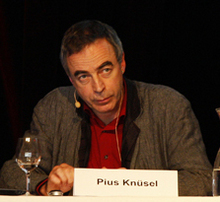Misunderstanding European Identity. Artists, ambassadors of themselves.
Once, artists were sent out as ambassador of their nations. Culture, as far as state subsidised, belonged to a canonised repertory assembling those works considered to be the best incorporations of ruling values. When Pro Helvetia, the Swiss Arts Council, organised its first exhibition of Swiss painting in 1949 in Germany, none of the dozen painters included was younger than 60 years. It still works this way with authoritarian countries.
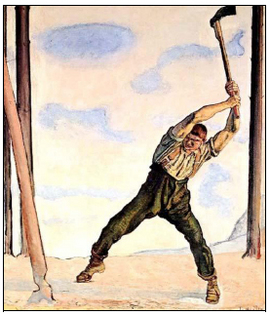
Ferdinand Hodler, Lumberjack, 1853; ideal incorporation of a conservative spirit.
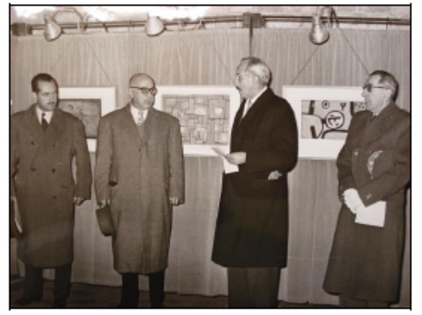
Paul Klee Vernissage, Barcelona 1951; looks more like politics than like art. In the dark coat: the swiss consul general to Barcelona, to his left the mayor of Barcelona.
In the meantime artists and art have shaken off the state embrace. One of the most important achievements of the 80ies and 90ies is, that the idea of a confined national culture has dissolved, at least in democratic nations. It is what we call freedom of art.
In the last 20 years (since the end of the cold war) we have set an end to the project of the nation state composed of one people, one border, one language and one common culture which started 200 years ago. We have set an end to one of the basic principles of modernity on which public funding of culture still is based: that a nation is defined by a fixed (official) set of values visible through arts. Of course we paid a price for this modernity. It was the extinction of hundreds of micro-cultures, geographically as well as socially. For without artists still would be chouchous of local dignities. Now we have free art and a universal arts discourse.
The deconstruction of the unifying identity of our nations can be seen to be a product of migration and of worldwide trade and accelerated communications on the one hand-side, in one term: of globalization; on the other hand-side it is the product of a new state of intellectual freedom which sets arts into opposition to the official powers, which even establishes them as a fifth power next to parliaments, governments, courts and media.
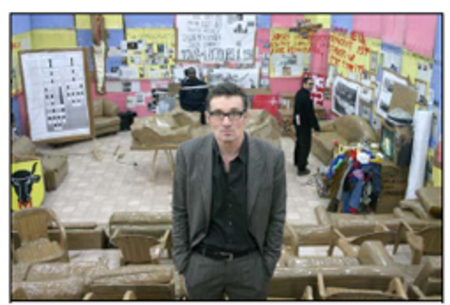
Thomas Hirschhorn, Swiss-Swiss Democracy, Paris 2004; Pro Helvetia was strongly criticised for this choice Hirschhorn not being a good ambassador of Switzerland, worse, blemishing the image of Switzerland by his critical approach to the myth of democracy. Pro Helvetia finally got punished by the Swiss parliament by a cut of 1 mio. CHF off the following year’s budget.
The nations have become multi-coloured, multi-cultured. The great mixing-up of peoples and cultures in the last two decades of the 20st century boosted a new kind of diversity. And it shook the overcome pattern of value-attributions to artistic expressions to the ground. The distinctions of high-brow-art and popular art, of traditional art and experimental art have become obsolete.
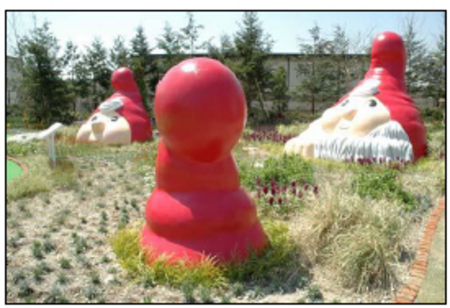
Ivana Falconi, Seven Deities, 2005, Aichi, World Exposition; Swiss artist representing Switzerland at the world exposition in Japan. Fun is the theme (though in this work, there is some sense of irony).
The process is irreversible, happily.
It is quite a challenge for public funding - to say goodbye to beloved canons, to traditions, to avant-garde and all our favourites. Politicians and our diplomats mainly suffer from the idea of loosening control over the artistic performance of their respective countries. Yet it is just normal.
When we support an artistic performance abroad, nowadays, we consider his or her work an interesting and fruitful contribution to a general idea of human values and intellectual or emotional freedom. That 's all. Where Swiss money is in, there is no longer a typical Swiss value, because typical Swiss values no longer exist. But there is something that we Swiss funders estimate an individual message contributing to the permanent self-questioning of others. So culturally Swiss today is where Swiss money is in. We compile a Swiss cultural identity without knowing its outline, we compile it as a flexible, steadily changing set of values which we, the funders, think helpful for our own life and that of others.
The same about Europe. It is a work in progress, a work without plan. Fortunately. Otherwise the concept of a European identity (which can be given in cultural terms only) would simply replace the former concepts of national identities. So the talk about a European identity is a false talk; again it is a talk of separation instead of integration.
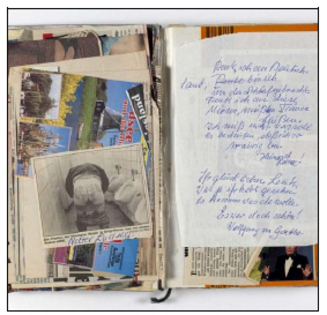
Christoph Büchel, Deutsche Grammatik, Fridericianum Kassel, 2008. What is Swiss in this work, what is German? It is a strong personal vision of present only, to be even more personalized by its spectators.
50 years ago, we constructed a cultural identity by selecting (excluding). And sending artists like messengers of this one and only cultural mode of living. Nowadays we are assembling. Artists are no longer ambassadors of their nations or supra-nations, they are ambassadors of themselves only. By supporting them we buy the copyright to add parts of their creation to what we call the artistic representation of our vision of (a better) life in the present world. Once we created an image, now we open channels of understanding. Or misunderstanding (what does not bother us).
Strangely enough, those defending global thinking, intercultural tolerance, permanent exchange – it is the avant-gardists of the 80ies and the 90ies – restrict the legitimacy of funding (or being funded) to allocation to nations or supra-nations. All this off-state-behaviour, the freedom of art comes to an end when it is about money. Then those speaking the most globalized talk turn out to be most fervent defenders of an old system of values. Recently Pro Helvetia supported an editor of Swiss literature financed by Germans – what a scandal. Recently Pro Helvetia refused to support George Gruntz's Concert Jazz Band
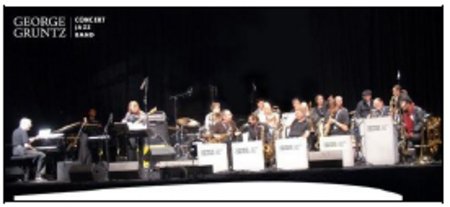
George Gruntz Concert Jazz Band, 2008
for its only American members. When it is about funding projects of immigrants, of course, they cannot compete with true European values – since these values do not incorporate our truly European visions of culture. Which, let us be honest, belong to a past since they are based on a system of segregation excluding immigrant communities and non-intellectual classes of our society from the manna of state subsidies.
Artists stripped off the role of state ambassadors. Now we have to deliberate them from playing ambassadors of our European elitism. Let us look at them as individuals. Let us forget about aesthetic concepts and art as social intervention and all this bla bla. Let us take into consideration the full range of expression, old and new, hard and soft, experimental and traditional. Any art – which turns into culture when confronted to an audience of any kind – helps people to understand who they are. This is our job: to help artists to make others understand. It does not need no nations. Neither a political nor an intellectual overhead. It needs sensitivity for emotions only. And money, yes.
1.11.2008


